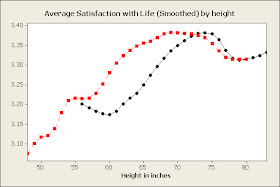I took a look myself, using the same data set Lindgren did (the General Social Survey), and he's on to something. The GSS has been used a lot, so I'm sure someone else had run the relevant statistics before, but he seems to have been the first to notice that there's a definite pattern. Here are some correlations between answers to a question on whether the government should try to equalize wealth and income and some questions about race, tolerance for unpopular points of view, and general assessments of people (are they fair, can they be trusted, would they try to help). The positive correlations mean that people who are opposed to redistribution tend to be more tolerant and optimistic. (The words in capitals are the names the GSS uses for the questions).
People .109
Tolerance .123
RACFEW .052
RACMAR .106
RACPRES .040
RACSEG .071But suppose you divide people into three groups based on educational level: not a college graduate, college graduate, graduate degree. Here are the correlations within each group:
No Degree BA Graduate
People .105 .011 .001
Tolerance .126 -.041 -.111
RACFEW .057 -.034 -.068
RACMAR .094 -.017 -.023
RACPRES .028 -.036 -.057
RACSEG .067 -.068 -.116The relationship changes with education. Among people with less education, opposition to redistribution goes with tolerance and optimism; among people with more education, support for redistribution goes with tolerance (and there's essentially no association between views of people and views of redistribution). Most people aren't college graduates, so the pattern among people as a whole is most like the pattern for people without a college degree.
I thought of an interpretation of the pattern. Altruists--people who care about others--will be more tolerant than selfish people. Poor people who are altruists will tend to oppose redistribution, but affluent people who are altruists will tend to support it. But that interpretation implies that the pattern would show up even more strongly if you divided people by income. It doesn't--it's education that makes the difference, not income.

